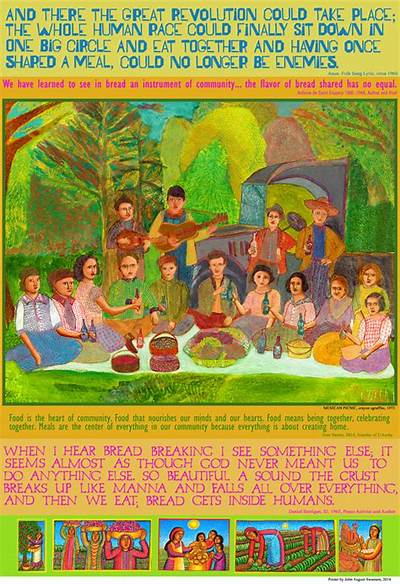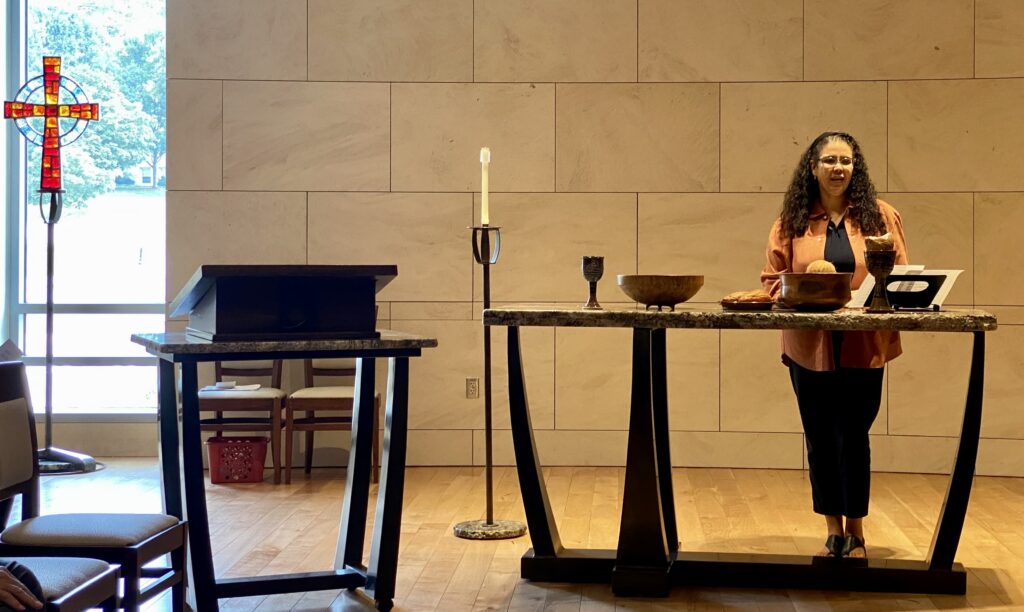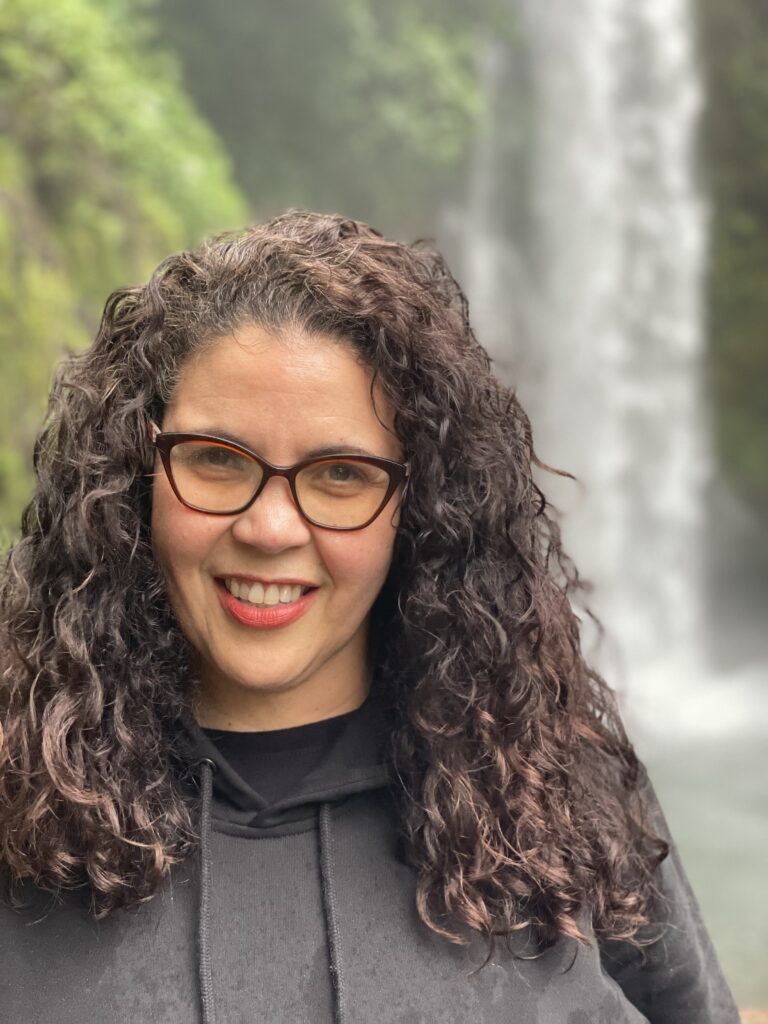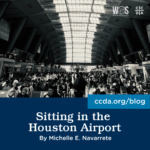
Family Picnic Poster
© 2014 by the John August Swanson Trust
Poster, 19″ x 13″
JohnAugustSwanson.com
by Rev. Joanne Solis-Walker, Ph.D
¡Interesante!
If I were asked to select one word to describe large portions of my journey as a Latina within theological education, it would be: Interesante or for the non-Spanish speaker, Interesting. I have had many rewarding opportunities as an administrator and professor, but they come paired with different types of challenges, porqúe la lucha is real.
I entered the world of theological education standing on the shoulders of great Latine scholars who paved the way. They were (are) brilliant and fierce. They had to be. Without coraje y ganas they could not endure the injustices encountered.
Many of these leaders were the first, first-generation of Latinx students in the academy. They were also the first generation of Latinx faculty and administrators serving in white-privileged academic institutions. It does not take long to recognize, when we are standing in the sombras of the epitomes of courage, persistence, and resilience. And such awareness does something to the way you think and respond to the good and the very complex.
Many years have gone by, and many lessons learned. We have won some and lost more than we can count. It has been and continues to be an interestante journey.
Al mismo tiempo, algo nuevo está pasando, – at least it feels like change is in the air.
Perhaps I am too optimistic, but I am inspired by some preliminary signs that suggest important shifts within theological education. There are many ways Hispanic and Latine communities are contributing to this change, as evidenced in the:
- Increased number of schools receiving funding to offer new programs in Spanish or in English but culturally designed for the Hispanic/Latine communities. For the first time, the educational opportunities range from certificate to accredited Theology Doctorate (Th.D.) programs.
- Increased number of HTI scholars (Hispanic Theological Initiative) pursuing Ph.D.’s and HTI alumni are serving in tenured track faculty positions or in other faculty or administrative roles.
- Increased number of Hispanic Bible Institutes (HBI) affiliated with the Asociación para la Educación Teológica Hispana (AETH). Some HBI’s are certified, which gives their graduates access to theological degree programs at a master’s level. This is part of an agreement between the Association of Theological Schools (ATS) and AETH.
- Increased number of students and graduates who have benefited from the graduate courses offered by the Hispanic Summer Program (HSP). Non-Hispanics professors have also participated in their faculty training, Through Hispanic Eyes.

There so many other testimonios que contar del progreso. It really is interesante, to witness how the struggles and the atrevimiento of those first Hispanos y Hispanas continues to generate new opportunities. It compels us to keep striving to make theological education accessible and attainable for our diverse Latine communities.
However, accessibility and attainability must be coupled with the relate-ability of programs. The times have changed. The needs of the church and society are not the same. Our ability to relate to our surroundings requires us to grow the spiritual, cultural, sociological, and emotional skills needed to navigate those changes in ways that will positively impact how we lead and empower our communities. Oh, how I long for this to be a new day for theological education.
As the Rev. Dr. Elizabeth Conde-Frazier has stated:
“But new things of the Spirit are taking place, because as the academy is less able to absorb new scholars into its structure, you’re getting people who are becoming bivocational scholars, and they’re becoming scholar-activists; they’re becoming scholar-pastors; they’re becoming scholars who lead nonprofits, scholars who are entrepreneurs.”
This is an interesante thought for those of us designing programs at seminaries. It is also a very opportune time for those within CCDA circles longing for culturally responsive and justice-oriented academic learning spaces. This is where theory, theology, and praxis intersect and are potentially bound by a deep commitment to the collective work that responsively serves diverse communities. It is about doing teológia en conjunto, para la comunidad.
I am a visionary builder and a CCDA practitioner embedded within theological education. When I hear about the “new things of the Spirit,” I feel invited to explore new ways to train and equip co-vocational practitioner-scholars as suggested by Conde-Frazier.
So, hear it as a clarion call issued to all scholar-activists, scholar-pastors, scholar-leaders of non-profits, scholar-entrepreneurs, and others who have not easily identified with the traditional forms of theological education. There are new things of the Spirit surfacing, and we are invited to stand on the shoulders of those gigantes de la fé, who inspire, mentor, and hold us accountable to remain faithful to the task of making theological education accessible, attainable, and culturally responsive. With that foundation and deep sense of responsibility, I joined others on a journey to build La Mesa Academy for Theological Studies at Candler School of Theology, Emory University.
In Fall 2024, La Mesa Academy will launch a 2-year graduate certificate program in theological studies. It is a multilingual program, initially focusing on Spanish, English, and Korean, that addresses the linguistic barriers limiting our ability to learn from others.
La Mesa is for a multiethnic and multicultural community of learners who represent different denominations, ethnicities, generations, gender, and geographical locations. It will offer a stand-alone program with a stacking degree option that is affordable and primarily online.
It will also be a path for ordination or licensing in specific denominations. It is for students who may not be interested in a graduate studies program or someone discerning if that is the right path for them. It is for those scholar-community developers and for the scholar-entrepreneurial desiring to be in a hospitable community that welcomes everyone to the table. It is a sacred space designed to hold conversations that address the divisive issues that have separated the Church for too long.
La Mesa Academy is ultimately for students seeking to engage in theological reflection in respectful and honoring ways with others who do not think or align with their perspectives. Paulo Freire once stated, “Education is an act of love and thus an act of courage.” This is what we seek to practice.
These are interesting times, and the invitation is to be a part of something, interesante.

About Rev. Joanne Solis-Walker, Ph.D

Consultant ▪️ Coach ▪️ International Speaker
Rev. Dr. Joanne Solis-Walker is Associate Dean and Professor of Practice of Leadership at Candler School of Theology, Emory University. She previously served as Associate Professor of Practical Theology and Special Assistant to the President on Diversity at Northwest Nazarene University. She has a Ph.D. in Organizational Leadership and Development with an emphasis on Ecclesial Leadership. Joanne is a practical theologian with extensive experience in leadership, global missions, and pastoral ministry. She is a visionary builder who has served in Christian higher education, innovating theological programs contextualized to serve diverse communities in Spanish and English. Dra. Solís-Walker is the co-founder and a lead consultant at CaminoRoad. She is an ordained minister of The Wesleyan Church and is married, raising four children.
- Partner and Strategist of CaminoRoad
- Associate Dean of La Mesa Academy for Theological Studies
- Professor in the Practice of Leadership
- Candler School of Theology, Emory University





